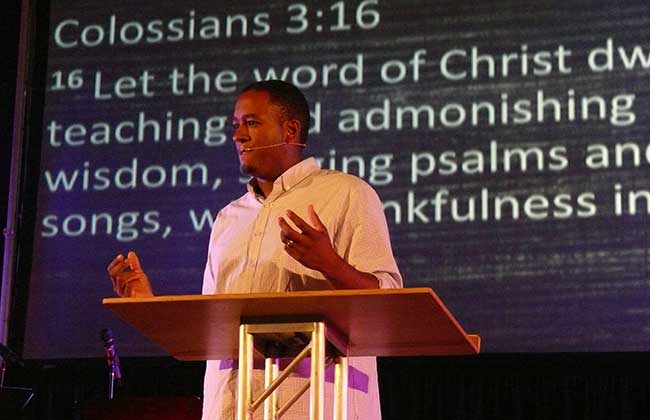Faith Church in Indiana is growing. To keep up, it has developed the Leadership Training Residency to train new leaders for ministry.
Church develops Leadership Training Residency program as its ministry expands
Four years ago, Garrette Horne and Faith Church (RCA) met when they moved into the same neighborhood in Hammond, Indiana.
Now Horne has completed the church’s Leadership Training Residency program and is pursuing further avenues for pastoral ministry.
“[My wife and I] had felt God’s call to ministry and were praying God would lead us to mentoring and training before we got started,” recalls Horne. “This church had its arms wide open and said they had this training opportunity, and would I consider it. And I said yes, and jumped right in.”
Faith Hammond is one of seven campuses of Faith Church of Dyer, Indiana, which began the Leadership Training Residency (LTR) in 2012. Through a combination of biblical training and hands-on experiences, participants study one of six LTR tracks: pastoral, worship, children’s ministries, general church leadership, technical arts, and serving.
“In order to effectively [be a] multi-site [church], we realized it was important to be proactive in training leaders to take on responsibilities at some point in the future,” says Barb Wondaal, the program administrator.
When Horne first met the people at Faith, he and his family had just purchased a home in Hammond, a diverse, urban, predominantly African-American and Hispanic city that borders Chicago, Illinois. At the same time, Faith was starting a congregation that met for worship in a local elementary school.
“We came to the area looking for ministry opportunities, and right around the corner they [Faith] were launching their new campus,” says Horne.
Following an extensive interview process, Horne was selected as one of a half-dozen students in the LTR pastoral track last year. The five-month residency includes training in four main areas: spiritual formation, pastoral leadership, church multiplication, and preaching.
“It’s cohort learning—learning in a small group,” says Horne of his coursework, which includes both peer and instructor assessments. “I’d say what helped me the most were the classes on leadership and the nuts and bolts of church planting.”
The LTR pastoral track meets four of the ten competencies in the RCA’s program for commissioned pastors and is part of a process for individuals seeking the designation. Classis Illiana has made LTR the recommended path for all commissioned pastor candidates. Several LTR grads have continued on with seminary training or were already in seminary when they began LTR. Several others are now serving in pastoral ministry at various Faith Church campuses.
Horne himself served as an intern at the Hammond campus over the summer: preaching, leading small groups, participating in church staff meetings, doing visitations, and focusing on evangelism and community engagement.
Since 2013 he has also met regularly with a mentor, Charlie Contreras, as a part of the LTR process. Contreras is pastor of the Hammond campus.
“Garrette has a wonderful ability to communicate in an encouraging and inspiring way,” says Contreras, who noted Horne’s background with nonprofit organizations doing youth and social work.
During the three-plus years of LTR, Wondaal says, more than 80 students have completed or are close to finishing their coursework and internship experiences in the various ministry areas. Because of intentionally small class sizes, most of the spaces are taken up by Faith Church members, but some non-members also participate in LTR.
“This year we have a resident of the Dominican Republic in the pastoral cohort group,” says Wondaal. The Dominican student studies as a distance learner and uses Skype to participate in the instruction and assessment sessions.
Meanwhile, Horne has been approved to serve as a teaching elder at Faith Hammond as he continues down his ministry path. And his mentor Contreras has a roadside view. “I think for Garrette and these [LTR] students to discover both their physical and creative talents, but also to join a developing learning community, gives them a positive environment to really flourish,” Contreras says.





